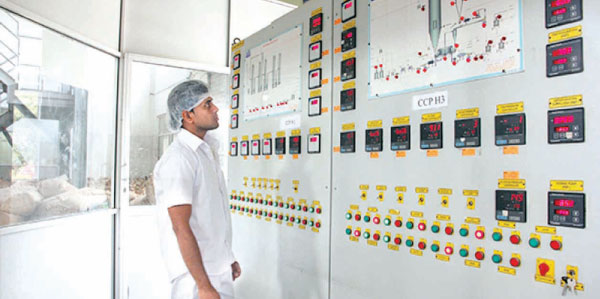Pelwatte Dairy Industries Limited (PDIL), will be investing Rs. 1.5 billion to open their second Dairy Factory in Kurunegala in June this year. The company, with the use of the latest Denmark technology, was already operating a factory in Buttala.
“We have already acquired the land, while construction would begin end of this month. Plans are also underway to open another factory in Kantale by end of 2019,” Chairman Ariyaseela Wickramanayake said.
 |
| Chairman Wickramanayake |
He said that according to local trade data, Sri Lanka spends over US$ 400 million annually, to import more than 80,000 tons of milk powder and milk based products each year.
“Sri Lanka is 80% self-sufficient in milk and there is no need to import them,” he said. Sri Lanka has 1.3 million milch cows, but sadly only about 240,000 cows are been used to collect milk.
He said that there is no scarcity of fresh drinking milk which are sold in super markets as well as shops in large numbers.
He explained that with a more efficient milk collection system, opening more collection centres and setting up more dairy factories, farmers would be encouraged to milk more cows. “This would ultimately increase the supply, which would help Sri Lanka achieve 100% self-sufficiency in milk.”
He said that Pelwatte Dairies is the only Sri Lankan 100% dairy manufacturer and they are now looking forward to expand their operations to other areas in Sri Lanka in the future.
Pelwatte Dairy through entirely local operation, supports 25,000 - 30,000 farmer families from whom milk is collected. over 150,000 - 200,000 litres of milk is collected per day and then churned in to butter, yoghurt, ice-cream, liquid and powder milk.
“With the opening of the Kurunegala factory, we would firstly contribute to the national economy by offering around 200 new jobs. The new factory in Kurunegala, would also provide livelihoods to over 2,500 new farmer families who would provide the people with fresh milk.”
Imports contains Palm oil, lactose
Pelwatte Dairy products including milk powder unlike imported milk power, do not contain any chemicals, other substances or preservatives added during the production process, making it healthy and safe for any aged user.
He said that there are audit reports in foreign governments and data that suggest that some of the world’s largest milk powder producing countries use palm oil and lactose to produce milk powder which are exported to third world countries such as Sri Lanka.
“If one studies one of the largest milk producing countries audited the annual import bill, one could observe that this country imports large amounts of lactose and palm oil. These imports are used to produce dairy products including powdered milk that are exported to third world countries.”
Export to China
Chairman Wickremanayake who is also founder Chairman of Master Divers and Pelwatte Sugar Industries Ltd., said that when both their Kurunegala and Ampara factories are opened and their production process streamlined, they have planned to export Milk power. “This would be a historic moment for Sri Lanka and we are looking at the Chines market.”
Pelwatte Dairy Industries, is the first private sector firm to invest in a milk production plant which produces Full Cream Milk Powder, Non Fat Milk Powder, Yoghurt, Butter, Ice Cream, Sterilized plain and flavoured milk and also ghee.

The plant which is operated under Indian technology, has a current output capacity of 1,200 tons per month. The animal feed plant produces a range of cattle feed products, including calf starter feed to transition the calf from the milk-feeding period to the dry feeding period, general cattle feed for heifer and dry cows and high-yield cattle feed for high yielding cows.
The feed is widely used by small scale farmers to medium sized farmers (25 Milch cows or more) to large farms having over 200 Milch cows.
Further, supporting the dairy industry in Sri Lanka, PDIL uses its model farm of 100 Milch cows to carry out training programmes regarding cattle nutrition.



Add new comment